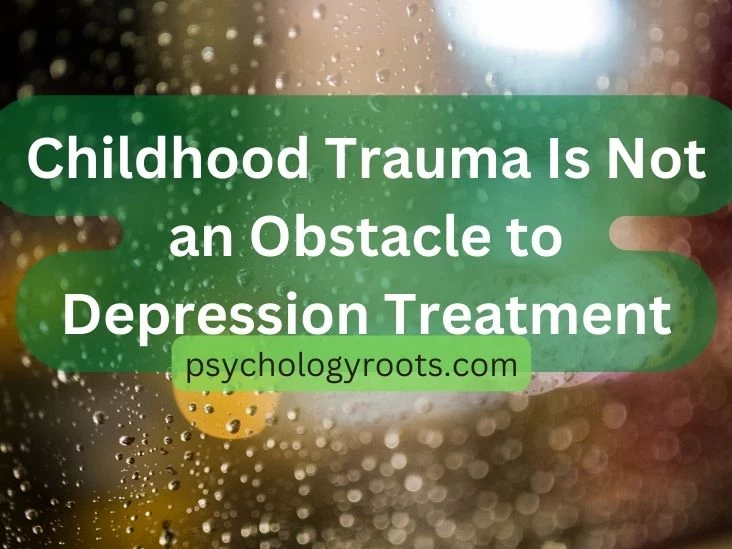Table of Contents
Childhood Trauma Is Not an Obstacle to Depression Treatment
Here in this post, we are discussing “Childhood Trauma Is Not an Obstacle to Depression Treatment”. You can read more about psychology-related material on our website. Keep visiting Psychology Roots.
Although some studies have connected childhood trauma to a less positive response to psychotherapy and medication for major depressive disorder, a recent meta-analysis has shown the opposite to be true.
A massive meta-analysis released on Thursday indicated that despite earlier studies suggesting that a history of childhood trauma has been related with a poorer response to therapy for major depressive disorder (MDD) in adulthood, this is not the case. The research found that all individuals with MDD should be provided psychotherapy and medication treatment. The results of the research were reported in The Lancet Psychiatry.

Previous research, the authors argue, is inconclusive because of “high between-study heterogeneity,” and because “some main studies indicate equivalent or even greater recovery for patients with childhood trauma than for those without” following psychotherapy or medication. There is a correlation between experiencing emotional or physical neglect or abuse before the age of 18 and the later onset of MDD. There is increased risk of morbidity, earlier onset of symptoms, and longer, more frequent disease cycles while dealing with MDD in these individuals.
In addition, a prior study indicated that the odds of an adult or teenager with MDD who had experienced childhood trauma were almost 1.5 times higher than those without MDD who had not experienced trauma. The research looked at three databases for randomised clinical trials published between November 21, 2013, and March 16, 2020. 54 trials were originally selected from a list of 10,505 articles, and 29 research were examined.
Europe hosted 51.7% of the trials, followed by North America with 31%. Major depressive disorder was the primary emphasis in the majority of the research (59%) whereas chronic or treatment-resistant depression was the primary focus in the remaining 38%. The risk of bias was rather significant in the majority of the research.
Sixty-two percent of the 6830 individuals (aged 18-85; information on sex and race was not available) had MDD and had experienced trauma as a youngster. Patients who had experienced childhood trauma presented with more severe depression at baseline but responded equally to active therapy as those who had not (treatment effect difference between groups g = 0.016; -0.094 to 0.125; I2 = 44.3%).
Because of the large number of studies focusing on chronic or treatment-resistant depression, the authors noticed that the prevalence of childhood trauma in this analysis was greater than the 46% identified in a previous meta-analysis. Patients in this group had a childhood trauma rate of nearly 75%. Emotional neglect and abuse were shown to be the most prevalent forms of trauma in this study, followed by physical abuse, physical neglect, and sexual abuse.
Although patients who had experienced trauma reported more severe depression at the outset and completion of treatment, childhood trauma did not moderate the response to antidepressants, modify the kind of treatment that was most effective, or increase the rate at which patients left therapy. Moreover, there was no significant difference in results by the following factors: research design, depression diagnosis, childhood trauma assessment technique, study quality, study year, therapy type, or treatment duration.
All instances of childhood trauma were reported retrospectively, and variations between sexes were not taken into consideration. These are only a few of the study’s flaws. Furthermore, the authors noted that this cohort “may benefit from therapy much less in the long term than individuals without childhood trauma.” Even while he deemed the findings promising, a psychiatrist who was not involved in the study cautioned that they should be read with care in a companion editorial.
Psychiatrist Antoine Yrondi, MD, PhD, from the University of Toulouse in France, noted that it is now common knowledge that exposure to traumatic events in infancy increases the risk of developing anxiety, PTSD, drug abuse, and metabolic and cardiovascular diseases later in life. “Epigenetic pathways may be responsible for at least some of the observed correlation. These co-occurring conditions may complicate the diagnosis and treatment of major depressive disorder.
He also mentioned that sleep problems, especially insomnia, may have an impact on MDD symptoms. Individuals with a history of trauma may have more chronic symptoms, so he suggests physicians pay special attention to them. The research did not compare remission rates of MDD between those with and without childhood trauma.
Yrondi stated that “it is crucial that doctors be educated to assess childhood trauma and to take it into consideration in their everyday practise” and that further study is required on the consequences of childhood trauma in MDD and associated concerns.
Help Us Improve This Article
Have you discovered an inaccuracy? We put out great effort to give accurate and scientifically trustworthy information to our readers. Please notify us if you discover any typographical or grammatical errors.
Make a comment. We acknowledge and appreciate your efforts.
If you have any scale or any material related to psychology kindly share it with us at psychologyroots@gmail.com. We help others on behalf of you.